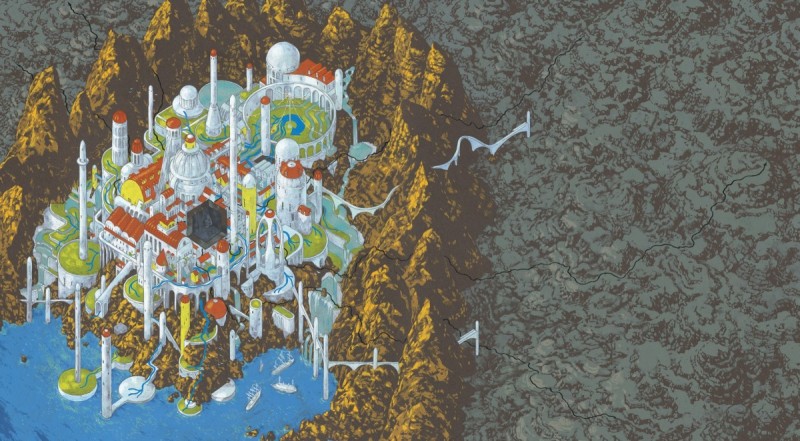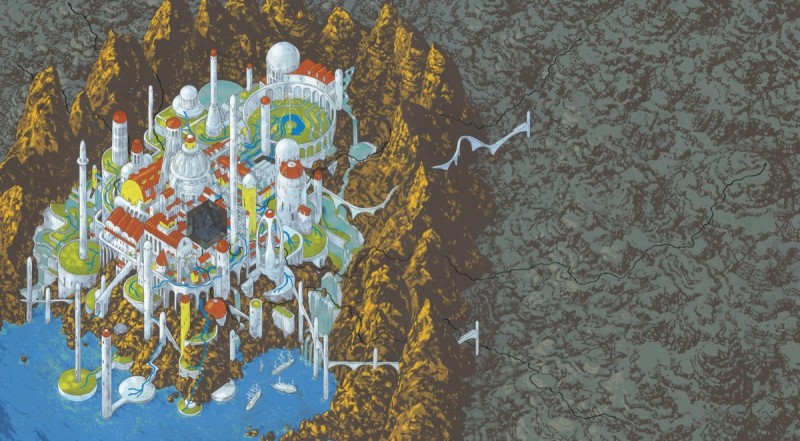Omelas and the moral catastrophe of climate change

An illustrated map of the city of Omelas, the setting of The Ones Who Walk Away From Omelas, a work of short fiction by science fiction writer Ursula K. Le Guin. Illustration by Andrew DeGraff.
In 1973, Ursula Le Guin imagined a city called Omelas, filled with vibrant art, culture, and public transit, home to farmers markets, smiling children, and a total lack of hierarchy. But this utopian community required the suffering of one child, in a basement, to function. It’s an allegory about utilitarianism—is a small amount of suffering justifiable if it means lives of serenity and fulfillment for an entire city? And it’s an allegory about those who wrestle with that question, the namesake of the story: The Ones Who Walk Away From Omelas.
Le Guin’s story is also an illustrative frame for the far less ethically ambiguous reality of climate change. Modern liberal capitalism has built an Omelas—mostly without the wonderful public transit—for a certain class, while sentencing billions to foreshortened lives of suffering as their metaphorical basements fill with water from rising seas and extreme weather.
In 1990, atmospheric carbon dioxide creeped past 350 parts per million, the threshold widely considered “safe” for maintaining a climate anything like the one humans have lived in over the course of our existence. Today, there are 415 ppm in the atmosphere and the trend shows no sign of slowing; atmospheric methane, a more powerful but less durable greenhouse gas, continues to set annual records as well.
Here’s the rub: 52 percent of the emissions since 1990 are attributable to the top 10 percent by income globally. In 2021, that top decile includes anyone earning more than roughly $55,000 CAD a year. As it happens, the wealthiest 10 percent are also capturing 52 percent of global income. While the exact match between those numbers is a coincidence, the correspondence is not: GDP and emissions have been tightly coupled since the dawn of the industrial revolution.
Whether or not GDP growth and emissions can be decoupled is a hotly debated question, but the accuracy of the historical coupling is not. What this means is that wealthy countries today are wealthy in large part because of their use of atmospheric space. The ex-imperial European nations and settler colonial states like the United States and Canada—the “Global North,” if you prefer—are “developed” and enjoy high average incomes precisely because, after colonizing much of the world’s landbase, they colonized the atmosphere.
To be clear, earning an income of $55,000 in much of Canada hardly puts you in the wondrous city of Omelas. But that’s what makes the moral catastrophe so much more outrageous: globally, the richest one percent emit 100 times more than the bottom 50 percent, and the consumption footprints of the billionaire class are eye-popping. Bill Gates personally emits as much in a year as an average global citizen would in 1,500 years. Roman Abramovich emits nearly 32,000 tons per year, as much as the same person would emit in more than 6,000 years. And crucially, these footprints are just from their yachts, private jets, and more recently, joyrides to space. They don’t include the far bigger emissions footprint of their businesses, investments, or political dealings. Microsoft profits handsomely from its work with the oil industry and Gates has built an empire around defending intellectual property rights, actively hindering adoption of low-carbon technologies (and vaccines) in the Global South. Abramovich is a Russian oiligarch.
To retain any hope of limiting warming to 1.5C, average per capita emissions need to drop to 2.3 tons of CO2 by 2030. Four billion people are already below that threshold today and always have been. These are by and large the same people who live in the countries most vulnerable to the impacts of fossil-fueled climate change. The countries whose delegations at climate conferences have begged the world to understand what is happening, saying things like, “How can you ask my country to go extinct?” and “We have been asked to sign a suicide pact.”
Saleemul Huq, the director of the International Centre for Climate Change and Development in Bangladesh, put it succinctly in a recent piece by David Wallace-Wells: rather than climate justice, “the issue is climate injustice… It’s wrong: Rich people are harming poor people—poor people around the world but also poor people in their own countries.”
It is a moral catastrophe, likely the worst in human history: a tiny subset of humanity has poisoned the atmosphere for their own benefit, and at least in the short term, they remain largely insulated from those effects. In other words, the world’s wealthiest live in Omelas: while they may or may not be “happy,” they have access to everything they could ever want. The only cost? The four billion people in the “basement” of the world, the Global South, who are being driven past the brink into a future that would be unimaginable if it weren’t already here, with water sources running dry, devastating extreme weather, entire regions becoming too hot to live in, forests burning and crops failing.
In Le Guin’s story, there’s ambiguity, a moral quandary about utilitarianism: rescuing the tortured child would mean a guaranteed loss for the entire city. In our story, there is no ambiguity: the happy city of Omelas is a walled fortress populated by a select few and dependent on the suffering of the billions of people that surround it.
We’ve seen what’s in the basement of Omelas. There are, no doubt, technical aspects to dealing with climate change. But most fundamentally, it’s a question of ethics: will we eke out a few more years of business as usual, knowing that it requires the suffering of the global majority? Or will we treat this as the horrific episode in human history that it is?
The ethical challenge for those of us here in the north, on the outskirts of Omelas, is to not walk away. The crime of global warming has been perpetrated over a long period, and for much of that time, the oil industry managed to keep Omelas’s magic secret. But the secret is out. The question is: will you sit idly by, or will you help end the greatest theft of life in the history of our species?
Nick Gottlieb is a climate writer based in Squamish, BC and the author of the newsletter Sacred Headwaters. His work focuses on understanding the power dynamics driving today’s interrelated crises and exploring how they can be overcome. Follow him on Twitter @ngottliebphoto.

